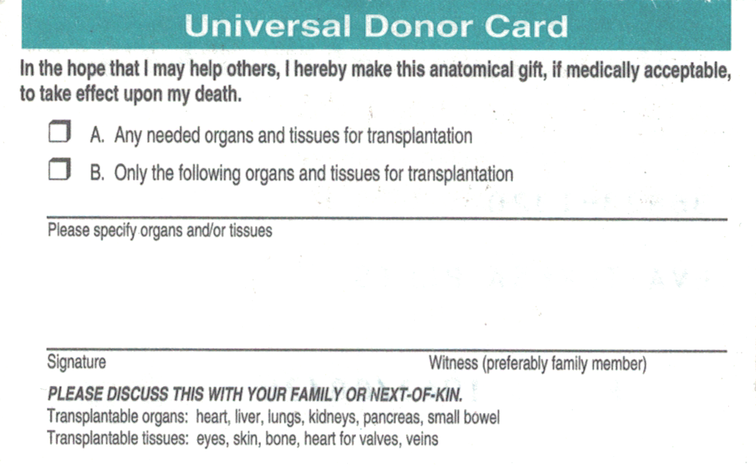The terrible bus crash involving the Humboldt hockey team and the story of Logan Boulet, the young victim kept on life support so that his organs could be donated, touched the hearts of Canadians. Logan had signed his organ donor card approximately six weeks before the accident, when he was old enough to do so. The story also prompted a huge spike in organ donation registration, particularly among young people.
Transplant technology has come a long way from the 60s and 70s when radical operations like heart or lung transplants were new, high-risk, dangerous and debilitating (in the sense that a lifetime of potent anti-rejection drugs caused other problems and side-effects). Today, patients are surviving transplant surgery and living normal lives with relatively little impairment. More and more transplant opportunities are arising, and the operations are more efficient.
What is lacking now, unfortunately, are donor organs.

According to James Breckenridge, president of the Canadian Transplant Society, Canada is one of the worst countries in the world for donation registration. He says that only 20% of Canadians have registered to be an organ donor, which is frustrating because it is so easy to do. In Alberta, for instance, it is as easy as going to MyHealth.Alberta.ca and searching “becoming a donor.”
Contrary to popular belief, there are no across-the-board age restrictions. Children under the age of majority can obtain a donor card with their parents’ permission and even newborns can be donors with parental consent. It’s also a myth that organ donation is only available from healthy people. Although the condition of an organ may prevent donation, in many instances, individuals with unhealthy kidneys or a liver, for example, can donate a heart or other organ unaffected by the disease. And don’t write yourself off as too old – according to a recent article quoting Breckenridge, the oldest donor he is aware of was a 90-year-old man who donated his liver.
One key piece of advice for preparing to become a donor: talk to your family and make sure they know your wishes. Even though you have signed a donor card and the hospital is aware of this, if you are admitted and unresponsive, your family has the right to overrule your wishes. For many families, the prospect of having their love one’s organs harvested when coming to terms with a tragedy could deter them from agreeing to donate. If the victim’s wishes are understood in advance, they may find the prospect more palatable.
According to the MyHealth.Alberta.ca website, just one organ and tissue donor can help save up to eight lives and make life better for up to 75 other people. Given that there is no cost to your family or your estate, and that the surgical care you receive is the same as any other surgery, what have you got to lose?
Organ donation may be the best (and last) give you will ever give.
Editor's note: Almost 100,000 registered as organ donors after the Humboldt Broncos crash. Here's an article in the Globe and Mail.
Banner photo credit: PrographerMan, Pixabay.com

